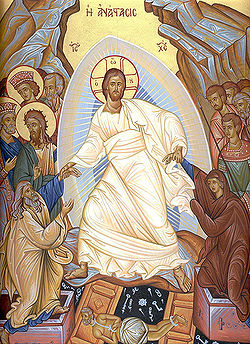Resurrection Sunday
| Easter | |
|---|---|

Icon of the Resurrection, with Christ, having kicked down the gates of Hades and pulling Adam and Eve out of the tombs. Christ is flanked by saints, and Satan, depicted as an old man, is bound and chained. (See Resurrection of Jesus in Christian art.)
|
|
| Type | Christian, cultural |
| Significance | Celebrates the resurrection of Jesus |
| Celebrations | Church services, festive family meals, Easter egg decoration, and gift-giving |
| Observances | Prayer, all-night vigil, sunrise service |
| Date | variable, variable |
| 2016 date | 27 March (Western) 1 May (Eastern) |
| 2017 date | 16 April (Western) 16 April (Eastern) |
| 2018 date | 1 April (Western) 8 April (Eastern) |
| Related to | Passover, of which it is regarded the Christian fulfillment; Septuagesima, Sexagesima, Quinquagesima, Shrove Tuesday, Ash Wednesday, Clean Monday, Lent, Great Lent, Palm Sunday, Holy Week, Maundy Thursday, Good Friday, and Holy Saturday which lead up to Easter; and Thomas Sunday, Ascension, Pentecost, Trinity Sunday, and Corpus Christi which follow it. |
Easter, also called Pascha (Greek/Latin) or Resurrection Sunday, is a festival and holiday celebrating the resurrection of Jesus from the dead, described in the New Testament as having occurred on the third day of his burial after his crucifixion by the Romans at Calvary c. 30 AD. It is the culmination of the Passion of Jesus, preceded by Lent (or Great Lent), a forty-day period of fasting, prayer, and penance.
Most Christians refer to the week before Easter as "Holy Week"—it contains the days of the Easter Triduum, including Maundy Thursday, commemorating the Maundy and Last Supper, as well as Good Friday, commemorating the crucifixion and death of Jesus. In Western Christianity, Eastertide, or the Easter Season, begins on Easter Sunday and lasts seven weeks, ending with the coming of the fiftieth day, Pentecost Sunday. In Eastern Christianity, the season of Pascha begins on Pascha and ends with the coming of the fortieth day, the Feast of the Ascension.
Easter and the holidays that are related to it are moveable feasts which do not fall on a fixed date in the Gregorian or Julian calendars which follow only the cycle of the sun; rather, its date is determined on a lunisolar calendar similar to the Hebrew calendar. The First Council of Nicaea (325) established two rules, independence of the Jewish calendar and worldwide uniformity, which were the only rules for Easter explicitly laid down by the council. No details for the computation were specified; these were worked out in practice, a process that took centuries and generated a number of controversies. It has come to be the first Sunday after the ecclesiastical full moon that occurs on or soonest after 21 March, but calculations vary.
...
Wikipedia
